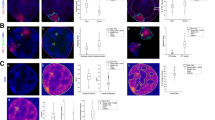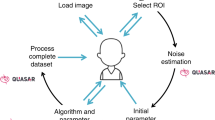Abstract
We present a complete pipeline for the segmentation of 3-dimensional electron microscopy data. Efficient algorithms and parallelization have been developed to make the system applicable to data as large as eight gigavoxels. Discrete geometry plays a prominent role at several processing stages (initial watershed segmentation, cell complex representation, reduction of oversegmentation by a graphical model, topological and geometric feature computation). Many modules described here are available via our open-source software repository.
Access this chapter
Tax calculation will be finalised at checkout
Purchases are for personal use only
Preview
Unable to display preview. Download preview PDF.
Similar content being viewed by others
References
HDF5 data storage technologies (2010), http://www.hdfgroup.org/HDF5/
Andres, B., Koethe, U., Kroeger, T., Helmstaedter, M., Briggman, K.L., Denk, W., Hamprecht, F.A.: 3D segmentation of sbfsem images of neuropil by a graphical model over supervoxel boundaries. Medical Image Analysis (2011)
Andres, B., Köthe, U., Kröger, T., Hamprecht, F.A.: How to extract the geometry and topology from very large 3D segmentations. ArXiv e-prints (2010) (submitted)
Baldacci, F., Braquelaire, A., Desbarats, P., Domenger, J.-P.: 3D Image Topological Structuring with an Oriented Boundary Graph for Split and Merge Segmentation. In: Coeurjolly, D., Sivignon, I., Tougne, L., Dupont, F. (eds.) DGCI 2008. LNCS, vol. 4992, pp. 541–552. Springer, Heidelberg (2008), doi:10.1007/978-3-540-79126-3_48
Bishop, C.: Pattern Recognition and Machine Learning. Springer (2006)
Breiman, L.: Random forests. Machine Learning 45(1), 5–32 (2001)
Cazals, F., Pouget, M.: Estimating differential quantities using polynomial fitting of osculating jets. Computer Aided Geometric Design 22(2), 121–146 (2005)
Damiand, G.: Topological model for 3D image representation: Definition and incremental extraction algorithm. Comput. Vis. Image Underst. 109(3), 260–289 (2008)
Denk, W., Horstmann, H.: Serial Block-Face scanning electron microscopy to reconstruct Three-Dimensional tissue nanostructure. PLoS Biology 2(11) (November 2004); PMID: 15514700 PMCID: 524270
Fourey, S., Malgouyres, R.: Normals and Curvature Estimation for Digital Surfaces Based on Convolutions. In: Coeurjolly, D., Sivignon, I., Tougne, L., Dupont, F. (eds.) DGCI 2008. LNCS, vol. 4992, pp. 287–298. Springer, Heidelberg (2008)
Jain, V., Murray, J., Roth, F., Turaga, S., Zhigulin, V., Briggman, K., Helmstaedter, M., Denk, W., Seung, H.: Supervised learning of image restoration with convolutional networks. In: ICCV 2007, pp. 1–8 (2007)
Jurrus, E., Hardy, M., Tasdizen, T., Fletcher, P.T., Koshevoy, P., Chien, C., Denk, W., Whitaker, R.: Axon tracking in serial block-face scanning electron microscopy. Medical Image Analysis 13(1), 180–188 (2009); PMID: 18617436
Jurrus, E., Whitaker, R., Jones, B., Marc, R., Tasdizen, T.: An optimal-path approach for neural circuit reconstruction. In: IEEE Int. Sym. Biomedical Imaging, pp. 1609–1612 (2008)
Kaynig, V., Fuchs, T.J., Buhmann, J.M.: Geometrical Consistent 3D Tracing of Neuronal Processes in ssTEM Data. In: Jiang, T., Navab, N., Pluim, J.P.W., Viergever, M.A. (eds.) MICCAI 2010. LNCS, vol. 6362, pp. 209–216. Springer, Heidelberg (2010)
Khalimsky, E., Kopperman, R., Meyer, P.: Computer graphics and connected topologies on finite ordered sets. J. Topology and its Appl. 36, 1–27 (1990)
Köthe, U.: Deriving Topological Representations from Edge Images. In: Asano, T., Klette, R., Ronse, C. (eds.) Geometry, Morphology, and Computational Imaging. LNCS, vol. 2616, pp. 320–334. Springer, Heidelberg (2003)
Kovalevsky, V.: Algorithms in Digital Geometry Based on Cellular Topology. In: Klette, R., Žunić, J. (eds.) IWCIA 2004. LNCS, vol. 3322, pp. 366–393. Springer, Heidelberg (2004)
Kovalevsky, V.A.: Finite topology as applied to image analysis. Comput. Vision Graph. Image Process. 46(2), 141–161 (1989)
Kreshuk, A., Straehle, C.N., Sommer, C., Koethe, U., Cantoni, M., Knott, G., Hamprecht, F.A.: Automated detection and segmentation of synaptic contacts in nearly isotropic serial electron microscopy images. PLoS ONE 6(10), e24899 (2011)
Lienhardt, P.: Topological models for boundary representation: a comparison with n-dimensional generalized maps. Computer-Aided Design 23(1), 59–82 (1991)
Macke, J.H., Maack, N., Gupta, R., Denk, W., Schölkopf, B., Borst, A.: Contour-propagation algorithms for semi-automated reconstruction of neural processes. Journal of Neuroscience Methods 167(2), 349–357 (2008); PMID: 17870180
Mishchenko, Y.: Automation of 3D reconstruction of neural tissue from large volume of conventional serial section transmission electron micrographs. Journal of Neuroscience Methods 176(2), 276–289 (2009)
Ren, X., Malik, J.: Learning a classification model for segmentation. In: Proc. ICCV 2003, pp. 10–17 (2003)
Sommer, C., Straehle, C., Köthe, U., Hamprecht, F.: Ilastik: Interactive learning and segmentation toolkit. In: IEEE International Symposium on Biomedical Imaging, March 30-April 2, pp. 230–233 (2011)
Sporns, O., Tononi, G., Kötter, R.: The human connectome: A structural description of the human brain. PLoS Comput. Biol. 1(4), e42 (2005)
Turaga, S.C., Murray, J.F., Jain, V., Roth, F., Helmstaedter, M., Briggman, K., Denk, W., Seung, H.S.: Convolutional networks can learn to generate affinity graphs for image segmentation. Neural Comput. 22(2), 511–538 (2010)
Vincent, L., Soille, P.: Watersheds in digital spaces: An efficient algorithm based on immersion simulations. IEEE Trans. Patt. Anal. Mach. Intell. 13(6), 583–598 (1991)
Vitaladevuni, S.N., Basri, R.: Co-clustering of image segments using convex optimization applied to EM neuronal reconstruction. In: CVPR 2010 (2010)
Yedidia, J.S., Freeman, W.T., Weiss, Y.: Understanding belief propagation and its generalizations. In: Lakemeyer, G., Nebel, B. (eds.) Exploring Artificial Intelligence in the New Millennium. Morgan Kaufmann (2003)
Author information
Authors and Affiliations
Editor information
Editors and Affiliations
Rights and permissions
Copyright information
© 2012 Springer-Verlag Berlin Heidelberg
About this paper
Cite this paper
Köthe, U., Andres, B., Kröger, T., Hamprecht, F. (2012). Geometric Analysis of 3D Electron Microscopy Data. In: Köthe, U., Montanvert, A., Soille, P. (eds) Applications of Discrete Geometry and Mathematical Morphology. WADGMM 2010. Lecture Notes in Computer Science, vol 7346. Springer, Berlin, Heidelberg. https://doi.org/10.1007/978-3-642-32313-3_7
Download citation
DOI: https://doi.org/10.1007/978-3-642-32313-3_7
Publisher Name: Springer, Berlin, Heidelberg
Print ISBN: 978-3-642-32312-6
Online ISBN: 978-3-642-32313-3
eBook Packages: Computer ScienceComputer Science (R0)




